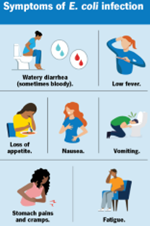TAG: GS-3: SCIENCE & TECHNOLOGY
THE CONTEXT: One person has died, and about 50 others have been hospitalized in the United States (US) due to E. coli infection, the cause of which is being reported as a food poisoning outbreak linked to Quarter Pounders with the E. coli infection O157:H7.
EXPLANATION:
About the E. Coli:
- It is a type of bacteria that can be found in the intestines of humans and animals.
- It is a rod-shaped bacterium of the Enterobacteriaceae family.
- While most strains of E. coli are harmless and even beneficial, some strains can cause illness and infections.
- Some kinds of E. coli can cause diarrhoea, while others cause urinary tract infections, respiratory illness, pneumonia, and other illnesses.
How does E. coli make people sick?
- The most familiar strains of E. coli that make you sick do so by producing a toxin called Shiga.
- Pathogenic E. coli can be transmitted to humans through contaminated food, water, or contact with fecal matter from infected individuals or animals.
- This toxin damages the lining of your small intestine and causes diarrhea.
- These strains of E. coli are also called Shiga toxin-producing E. coli (STEC).
- The STEC that is most well-known and most often referred to is E. coli O157:H7, or just E. coli O157.

What are the symptoms of E. coli poisoning?
- Symptoms of an E. coli infection can vary depending on the specific strain and severity of the infection.
- Common symptoms include diarrhea (which may be bloody), abdominal pain and cramping, nausea, and sometimes fever.
- In severe cases, E. coli infections can lead to hemolytic uremic syndrome (HUS), a condition that can cause kidney failure and other complications, especially in young children and the elderly.
Treatment:
- Most E. coli infections are self-limiting and resolve on their own without treatment. However, it’s essential to stay hydrated during the course of the illness.
- In severe cases or when complications arise, medical attention may be required.
Source:
Spread the Word



